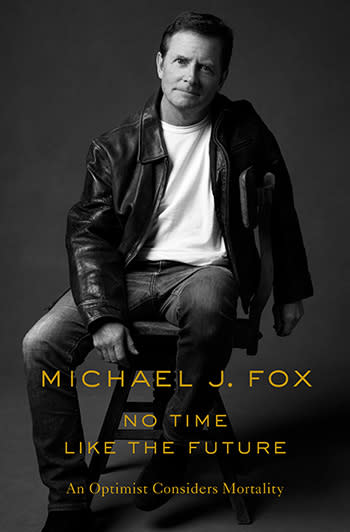Michael J. Fox on his decision to stop acting amid Parkinson's battle: 'Not being able to speak reliably is a game-breaker'
Michael J. Fox created such iconic characters as a young actor — like Back to the Future’s Marty McFly and Family Ties’s Alex P. Keaton — that make him seem eternally young in pop culture history. But he admits he’s been thinking about his mortality as he enters the 30th year of his Parkinson’s disease battle and deals with additional health challenges.
In an interview with the New York Times, the 59-year-old actor talked about his fourth memoir, No Time Like the Future, in which he gets extremely honest after questioning whether he oversold the idea of hope in how he’s portrayed his battle with the disease, a degenerative disorder of the central nervous system.

“I had this kind of crisis of conscience,” Fox said. “I thought, what have I been telling people? I tell people it’s all going to be OK — and it might suck!”
To be totally honest, his last few years largely fell into the “sucky” category. On top of the minute-by-minute challenges with the neurodegenerative disorder — which can cause uncontrollable tremors, uncomfortable stiffness as well as cognitive issues and moodiness, among things — he had to undergo surgery to remove a benign tumor on his spinal cord in 2018.
As a result, he had to learn to walk again.
The kick in the teeth came four months later amid that struggle. He fell in the kitchen of the NYC home he shares with his wife and Family Ties co-star Tracy Pollan and fractured his arm. The injury was so bad it necessitated 19 pins and a plate to stabilize it.
Before he had the surgery on the tumor, he was working on another book (about his favorite sport, golf, which he still plays), he said. “Then life happened” and he changed course.
“I started thinking about what it meant to be able to move and express myself physically, to have that taken away,” he said about writing this book. “And then dealing with the surrender it takes to lie down and say, ‘Cut me open.’ I don’t know what that’s like for anybody else, but I can figure out what it’s like for me and write it down.”

In the book, Fox shares his insights amid this health journey. For instance, he writes about being pushed around in a wheelchair and how “generally the person in control is a stranger,” which made him feel like “luggage” — how he’s expected to “just sit still” and not “say much.”
And he wondered, in the book, “Have I been an honest broker with the Parkinson’s community? The understanding I’ve reached with Parkinson’s is sincere, but the expression of it risks being glib.” And while he used to be a person who made lemonade out of lemons, now he feels like, “Screw it — I’m out of the lemonade business.”
Fox, who underwent a brain-drilling procedure to help his Parkinson’s, told the NYT he’s all about candor, and quickness, these days, noting, “I’m not going to tell anyone about anything other than my experience. I’m 59 years old, and I got no time for small talk.”
His longtime producing partner, Nelle Fortenberry, who assisted him in writing the book, not as a ghost writer or co-author, but just physically helped by typing and doing things Fox can’t, said this book is a side of him people haven’t seen.
“This book gives a different side of him, and it’s not manufactured,” she said. “It’s 100 percent real. And heart-wrenching.”
Fox also spoke about his Michael J. Fox Foundation, which has funded more than $1 billion in Parkinson’s research in its 20 years, admitting sadly, “I’d hoped we’d be out of business by now. I thought we’d find a cure — oil and dog hair will fix it, or something like that.”
He also talked about his decision to stop acting, noting, “not being able to speak reliably is a game-breaker for an actor.”
Despite his struggles, wife Pollan has remained a constant for him — helping him every step of the way. He said the book is also “a love letter to Tracy,” whom he married in 1988, “She really got me through” — taking a breath — “everything.”

In 1990 while making Doc Hollywood, Fox’s left pinkie began twitching uncontrollably. The following year, he was diagnosed with young-onset Parkinson’s at age 29. He kept it a secret publicly — and tried to mask the depression he dealt with over it by drinking. A drunken incident, which his young son saw him asleep on the floor next to a spilled beer can, led him to get sober and start therapy.
He didn’t go public with his diagnosis until 1998, which by then caused such trembling in his left arm and leg that the Spin City star asked his limo driver to circle the block three times before dropping him off at the Golden Globe Awards that year. In 2000, he stepped back from acting full-time. While he tried another series, The Michael J. Fox Show (2013-14), he’s largely guest-starred, including arcs or recurring roles on Designated Survivor, The Good Wife, Boston Legal and Boston Drama.
However, in addition to not being able to speak reliably, he said recently that his short-term memory is also “shot,” making learning lines impossible.
"I always had a real proficiency for lines and memorization,” he told People magazine. “And I had some extreme situations where the last couple of jobs I did were actually really word-heavy parts. I struggled during both of them.”
No Time Like the Future is available Tuesday, Nov. 17 on Amazon.
Read more from Yahoo Entertainment:
